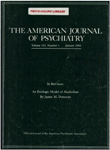Overview: cerebrovascular accident and the hospitalized elderly--a multidimensional clinical problem
Abstract
A cerebrovascular accident is unwelcome at any age, but for the elderly it involves concerns. The abrupt onset of a cerebrovascular accident signals anew the already present fears of loss of control, death, insanity, disfigurement, loss of physical function, and sexual impairment. The accident can also result in worry about the possibility of explosive recurrence, disruption of thoughts and emotions, lengthy treatment away from home, and exhaustion of retirement funds. Therapeutic endeavors must be eclectic and individually tailored to address the special needs of the elderly patient, the highly technical and diverse health care team, the worried family, and the depression, delirium, and subtle clinical syndromes manifesting as poor patient motivation that often accompany a cerebrovascular accident.
Access content
To read the fulltext, please use one of the options below to sign in or purchase access.- Personal login
- Institutional Login
- Sign in via OpenAthens
- Register for access
-
Please login/register if you wish to pair your device and check access availability.
Not a subscriber?
PsychiatryOnline subscription options offer access to the DSM-5 library, books, journals, CME, and patient resources. This all-in-one virtual library provides psychiatrists and mental health professionals with key resources for diagnosis, treatment, research, and professional development.
Need more help? PsychiatryOnline Customer Service may be reached by emailing [email protected] or by calling 800-368-5777 (in the U.S.) or 703-907-7322 (outside the U.S.).



